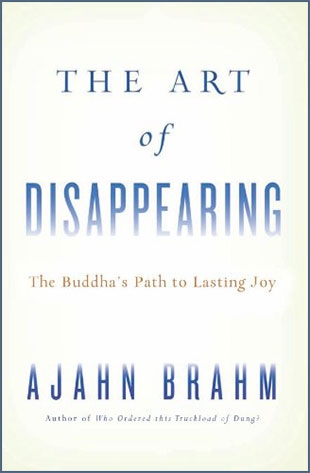Ajahn Brahm attended Cambridge University where he earned a degree in theoretical physics. He left the academic world and ventured into the jungles of Thailand and spent nine years studying with the meditation master Ajahn Chah. In 1983, Brahm was asked to assist in the establishment of a monastery near Perth, Western Australia. Brahm is today a revered spiritual guide and abbot of one of the largest monasteries in the southern hemisphere. He is the author of Who Ordered This Truckload of Dung?
In this well-done and illuminating work, Brahm shines a light on the spiritual practice of mindfulness. The Buddhist refuses to run away from suffering; instead, he or she tries to contemplate and understand it and its causes. Then there is the challenge of examining life:
"When you contemplate life you come to realize that it's completely out of control. And whatever is out of control is none of your business. There's a wonderful little saying that I've used in my meditation and that I encourage others to use as well. Whatever you are experiencing, in the monastery or elsewhere, say to it, 'Not my business.' Whatever happens to the water supply, to people coming and going, to the food that is offered, to the weather, say to it, 'It's not my business.' "
This equanimity approach means that little things will no longer bother or upset you. When you regard something as none of your business, it disappears from your world and you are free to deal with what matters to you. As more and more things fade from your world, you arrive at a beautiful place, the stillness of the mind.
Brahm refers to the Buddha's contention that attachment to deep meditation can lead only to the stages of enlightenment. There are many satisfactions on this path, which lead to more fading away and letting go. Part of the pleasure comes from overcoming the obstacles in meditation such as boredom, restlessness, dullness, desire and ill will, and allowing the "you" to disappear. Brahm shares another brief phrase which is good medicine for overcoming many of these obstacles:
" 'Good enough' . . . is a beautiful mantra. It's great to use in your meditation no matter what you're experiencing. If you're so tired that your head is almost on the floor, say, 'This is good enough.' As you breathe in and out, say, 'Good enough.' But you have to be consistent and make every moment good enough."
Brahm is convinced that meditation helps us replace willpower with wisdom power. It enables us to move beyond a fault-finding mind of negativity. It also trains us for the journeying on the path of renunciation where the emphasis is on fading away and disappearing. Eventually we uncover the bliss of peace, stillness, and a radiant mind.
